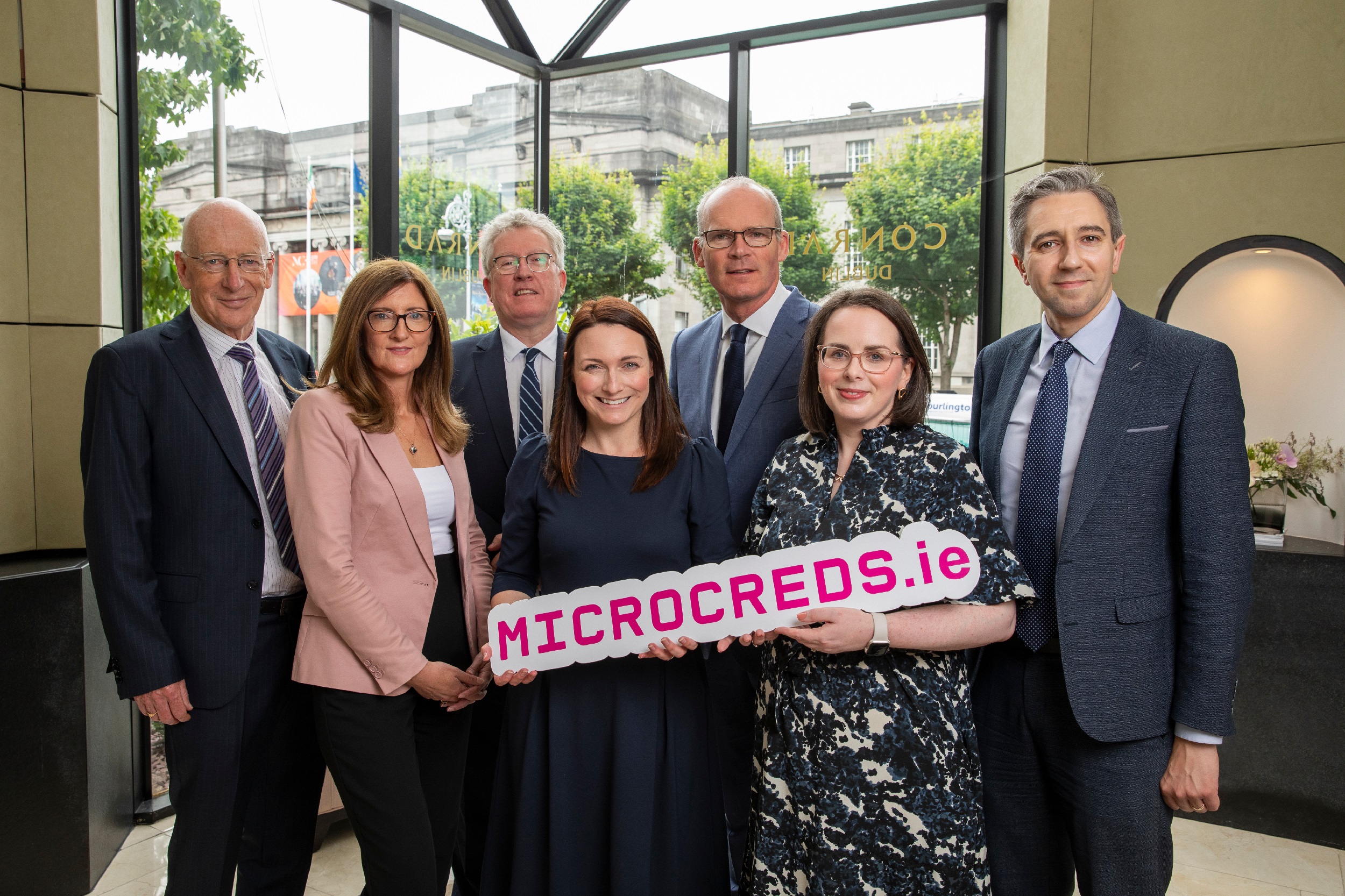

Education
UL awarded €1.7m funding for 1,900 places on micro-credential courses
UL awarded funding from MircoCreds.ie, pictured above are Tony Donohue, Chair of the Expert Group on Future Skills Needs, Daire Keogh, President, DCU, Simon Coveney, Minister for Enterprise, Trade and Employment and Simon Harris, Minister for Further and Higher Education, Research, Innovation and Science and (front l-r) Ger Carroll, University of Limerick, Professional Education Manager, Jools O’Connor, IUA MicroCreds Project Lead and Dr Emma Francis, Senior Project Officer for MicroCreds
UL has been awarded 1,965 places which is approximately 14% of the total places on offer nationally

University of Limerick has been awarded €1.7m in funding for more than 1,900 subsidised places on micro-credential courses.
Minister for Further and Higher Education, Research, Innovation and Science Simon Harris TD announced funding of €9.7m to subsidise fees for 13,879 learners across 654 micro-credential courses.
UL has been awarded funding worth €1.7m to subsidise up to 80% of selected course fees for micro-credential courses and one-year professional diplomas, aimed at expanding educational opportunities for part-time learners and bridging much needed national skills deficits.
UL has been awarded 1,965 places which is approximately 14% of the total places on offer nationally.
Micro-credential courses, designed to meet the evolving needs of learners, enterprises, and society, offer small, accredited programs awarding between 1 and 30 ECTS and provide awards at Levels 6-9 on the National Framework of Qualifications.
The inherent flexibility of micro-credentials allows learners to access education in small, manageable units, accommodating their life and work commitments.
Welcoming the announcement, UL President Professor Kerstin Mey said: “This significant investment underscores UL’s dedication to fostering accessibility and flexibility in third level education, while catering to the evolving needs of professional learners.
“The University has delivered consistently on its strategic targets to offer flexible learning routes for Ireland’s workforce, and we welcome this very considerable investment by the government and the Minister of funding to subsidise courses for learners.
“These bite-sized, accredited, enterprise-powered qualifications allow learners to gather skills and competencies in a flexible, fast and affordable way and are an important part of the offering we have at UL.
“The cultivation of micro-credentials aids life-long learning journeys and allows the further acquisition of knowledge, skills and experiences and addresses skills in key areas.”
Minister Simon Harris said: “As part of the Year of Skills, we have been encouraging everyone to learn a new skill so they can evolve in line with how the world of work is changing.
“While traditional degree programs are essential, they may not always be the right option to equip individuals with the targeted, up-to-date skills required in the modern workplace.
“Micro-credentials bridge this gap, offering a flexible and accessible solution to empower individuals in excelling in their chosen fields.
“These subsidies are a fantastic opportunity for individuals to access micro-credential courses at reduced rates, providing flexible learning and upskilling opportunities for learners and enterprises alike.
“Some courses also offer stackability, encouraging learners to return and build upon their skills for further qualifications.
“It’s also important to note that these courses cover critical areas such as new and emerging technologies, construction and Climate/Sustainability and Energy, and align with the priorities outlined as part of Housing for All and the Government’s Climate Action Plan.”
Professional Education Manager Ger Carroll said: “UL has a strong reputation for delivering skills focused learning that can be applied directly in enterprise. This funding announcement provides more access for learners and enterprises to engage in flexible postgraduate education. You can work, and study at the same time. And now you will be financially supported to do so.”
The places on offer at UL will be available across a diverse array of 112 short, part-time courses including ICT, Data, AI, Sustainability Supply Chain and Tax, Health and Nursing.
UL is one of seven universities working to deliver short, stackable learning as part of the national MicroCreds Project, and similarly, the UL@Work project has delivered over 20, one-year, part-time Professional Diplomas, which can be combined or stacked to achieve a new flexible Masters called the Master of Professional Practice.
These initiatives have been accelerated through UL’s engagement with the Human Capital Initiative (HCI) to date.
The 50% – 80% learner fee subsidy is designed to raise awareness of the benefits of micro-credential learning and encourage participation in the courses, while offering courses at a reduced fee rate.
The goal is to directly increase Ireland’s lifelong learning participation rates.
More information on the micro-credential courses and professional diplomas can be found on the Graduate and Professional Studies website.
Related stories














